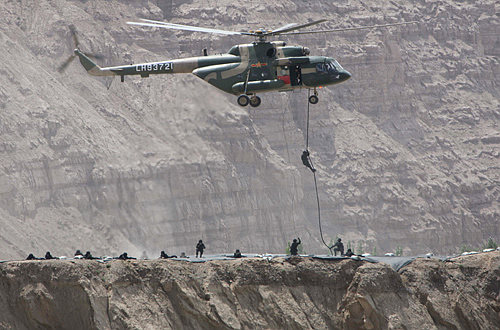|
 |
|
ANTI-TERROR DRILL: China, Kyrgyzstan and Tajikistan carry out a joint anti-terror drill on May 6 in Kashgar, China's Xinjiang Uygur Autonomous Region (YUAN MAN) |
The recent financial crisis tested the organization's coordination ability. Thanks to the anti-crisis decisions made at SCO summits and prime ministers' meetings, SCO member states stepped out of the swamp of economic stagnation earlier than other regions. In 2010, the total GDP of SCO member states was $7.6 trillion, and trade between SCO members and other countries reached $3.6 trillion. The organization has made great contributions to world economic recovery.
Cooperation in the fields of science, technology, agriculture, disaster relief, tourism and culture has improved as well. SCO member states have conducted bilateral and multilateral discussions on issues such as climate change, environmental protection, natural resources exploitation and regional food safety.
Challenges
Although the SCO has achieved steady development during the past decade, it remains a young regional organization. It still faces tough challenges.
Its security concept runs counter to that of the United States and NATO. The SCO insists on the principle of "non-alignment, non-confrontation and not targeting third countries," calling on countries to settle disputes and conflicts by peaceful means. The United States sticks to Cold War thinking of realizing its own security and the security of its allies by maintaining a military advantage and strengthening NATO. The SCO confronts challenges as it tries to coordinate with Washington and NATO on their different security concepts.
The SCO's traditional and non-traditional security cooperation needs to be improved. Large-scale multinational military exercises can do little to curb individual suicide bombings and other small-scale terrorist activities. When social turmoil broke out in Kyrgyzstan, the SCO failed to find any efficient measures to keep the situation from deteriorating, except for expressing support and concern.
China and Russia have different understandings of the SCO's status. China hopes to improve its political influence and maintain vigorous economic development. Russia looks forward to cementing bonds with its Central Asian partners through SCO cooperation to reinvigorate the Russian-led Collective Security Treaty Organization and Eurasian Economic Community, so as to regain its influence in Central Asia. Therefore, Russia isn't willing to see the SCO develop too rapidly, especially in economic and energy cooperation.
Central Asian SCO members are paradoxical about conducting win-win economic and trade cooperation with China. Although China's giant market and huge investment potential and Central Asian nations' underdeveloped manufacturing industry and investment shortages could form a complementary framework for cooperation, Central Asian members argue such a framework is not helpful to their long-term economic development. As a result, they are often hesitant to deepen and expand cooperation with China, worrying about excessive economic dependence on China.
Enlargement also poses a problem to the SCO. Although a protocol of accepting new member states was formally signed in 2010, SCO members have yet to reach a consensus on which applicant should be accepted first. If this problem cannot be solved soon, it will negatively affect the SCO's reputation.
Influence
Cooperation in the SCO has discarded Cold War thinking and transcended ideology, providing a good example of harmonious coexistence among nations of different religions and cultures. Member states include adherents of Taoism, Buddhism, Eastern Orthodox Christianity, Hinduism and Islam.
With China and Russia, the SCO occupies two of the five permanent UN Security Council seats. The organization is poised to play an increasingly important role in promoting regional economic development and cultural cooperation as well as guaranteeing regional security. In the future, it will continue to help boost economic development in member states and the region at large.
The SCO is of strategic significance to both China and Russia. It is also important for Central Asian member states, not least because China is their major investment and trade partner. The SCO also provides them with a premium platform to conduct independent diplomacy and promote economic growth.
The author is Director of the China Center for Periphery Security Studies at the China Institute of International Studies
Trade Growth
China's trade volume with other SCO members in 2010 was eight times higher than in 2000, reaching $83.97 billion. In 2010, the total GDP of SCO member states was $7.6 trillion, and trade between SCO members and other countries reached $3.6 trillion. | 